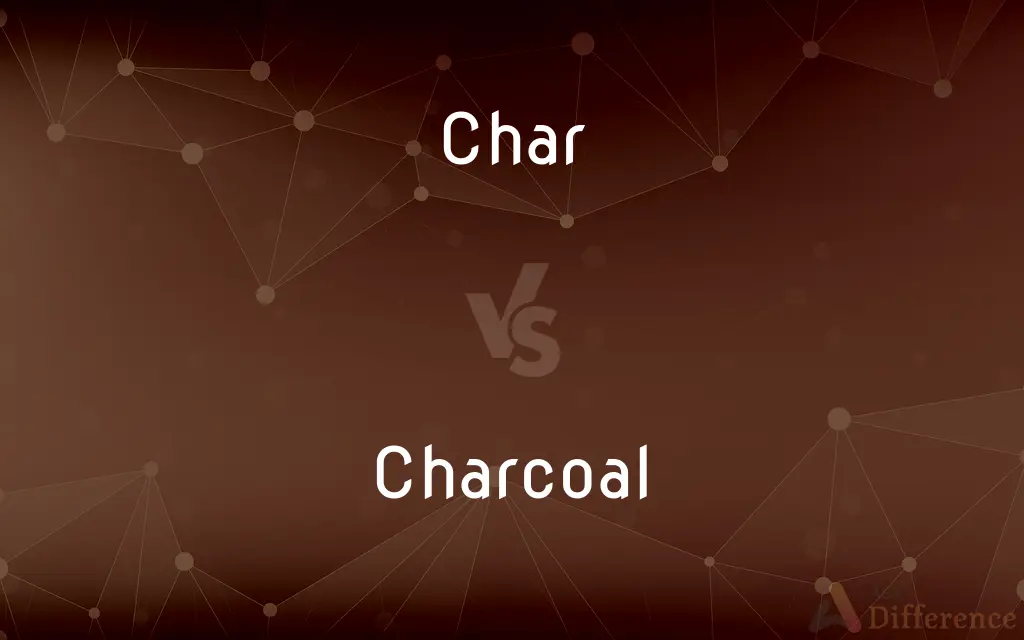Char vs. Charcoal — What's the Difference?
Edited by Tayyaba Rehman — By Urooj Arif — Updated on March 22, 2024
Char refers to partially burnt material, while charcoal is a fuel made by slow-burning organic matter.

Difference Between Char and Charcoal
Table of Contents
ADVERTISEMENT
Key Differences
Char is the result of incomplete combustion, where organic material is burnt but not fully turned to ash, retaining some carbon structure. It can occur in various contexts, from cooking to wildfires, leaving behind blackened remnants. Charcoal, on the other hand, is deliberately produced through the slow pyrolysis of wood or other organic materials in the absence of oxygen, creating a porous, carbon-rich substance used primarily as fuel or for drawing materials.
The process of creating charcoal involves controlled conditions to maximize the conversion of wood or other materials into a substance with high carbon content and porosity, enhancing its fuel properties. This contrasts with charring, which can be accidental and result in a range of materials from lightly singed to heavily carbonized, without the consistency or utility of charcoal.
Charcoal is valued for its ability to burn at high temperatures and for longer durations with less smoke compared to raw wood, making it preferable for grilling, in furnaces, and for filtering applications. Char, while it may share some of these carbonized characteristics, is not optimized for such uses and is often considered a byproduct or waste.
In addition to fuel, charcoal has various applications, including in art (charcoal drawing), as a soil amendment (biochar), and in medical and filtration uses due to its adsorptive properties. The controlled production process of charcoal ensures it has the desired properties for these specific applications, which char, being a more random byproduct of incomplete combustion, typically lacks.
Understanding the distinction between char and charcoal is important for their appropriate use, especially in contexts requiring specific combustion characteristics, such as in cooking or filtration, where the consistent quality and properties of charcoal are essential.
ADVERTISEMENT
Comparison Chart
Definition
Partially burnt organic material
Carbon-rich fuel made by slow-burning organic matter
Production
Result of incomplete combustion
Produced through controlled pyrolysis in low oxygen
Consistency
Can vary widely
More uniform and consistent
Uses
Often considered waste or byproduct
Widely used as fuel, in art, filtration, and soil amendments
Properties
May retain some carbon structure
High carbon content, porosity, burns at high temperatures with less smoke
Compare with Definitions
Char
The residue of incomplete combustion of organic material.
The charred remains of the wood were scattered around the campfire site.
Charcoal
A porous black solid, obtained as fuel.
We'll need more charcoal for the barbecue this weekend.
Char
Can result from a variety of combustion processes.
The kitchen accident left a char on the wooden countertop.
Charcoal
Employed in filtration systems due to adsorptive properties.
The water filter uses charcoal to remove impurities.
Char
The process of lightly burning the surface of food to enhance flavor.
The chef expertly charred the vegetables to add a smoky taste.
Charcoal
Made by the slow pyrolysis of wood or other organic materials.
The charcoal was produced in a kiln designed to limit oxygen.
Char
Often considered waste or a byproduct.
The char from the industrial process was discarded.
Charcoal
Used for drawing and sketching in art.
The artist chose charcoal for its deep, rich lines.
Char
The state or appearance of being burnt.
The char on the toast was scraped off before serving.
Charcoal
Used as a soil amendment known as biochar.
Adding charcoal to the soil improved its fertility over time.
Char
Char is the solid material that remains after light gases (e.g. coal gas) and tar have been driven out or released from a carbonaceous material during the initial stage of combustion, which is known as carbonization, charring, devolatilization or pyrolysis.
Charcoal
Charcoal is a lightweight black carbon residue produced by strongly heating wood (or other animal and plant materials) in minimal oxygen to remove all water and volatile constituents. In the traditional version of this pyrolysis process, called charcoal burning, the heat is supplied by burning part of the starting material itself, with a limited supply of oxygen.
Char
To burn the surface of; scorch.
Charcoal
A porous black solid, consisting of an amorphous form of carbon, obtained as a residue when wood, bone, or other organic matter is heated in the absence of air.
Char
To reduce to carbon or charcoal by incomplete combustion. ]
Charcoal
A black, porous, carbonaceous material, 85 to 98 percent carbon, produced by the destructive distillation of wood and used as a fuel, filter, and adsorbent.
Char
To work as a charwoman.
Charcoal
A drawing pencil or crayon made from this material.
Char
Any of several salmonid fishes of the genus Salvelinus, usually having a dark body with light spots, and including the arctic char, the brook trout, and the lake trout.
Charcoal
A drawing executed with such a pencil or crayon.
Char
A charwoman.
Charcoal
A dark grayish brown to black or dark purplish gray.
Char
(ergative) To burn something to charcoal.
Charcoal
To draw, write, or blacken with a black, carbonaceous material.
Char
To burn slightly or superficially so as to affect colour.
Charcoal
To charbroil.
Char
(obsolete) To turn, especially away or aside.
Charcoal
Impure carbon obtained by destructive distillation of wood or other organic matter, that is, heating it in the absence of oxygen. Category:en:Carbon
Char
To work, especially to do housework; to work by the day, without being a regularly hired servant.
Charcoal
(countable) A stick of black carbon material used for drawing.
Char
(obsolete) To perform; to do; to finish.
Charcoal
(countable) A drawing made with charcoal.
Char
To work or hew (stone, etc.)
Charcoal
A very dark gray colour.
Char
A charred substance.
Charcoal
Of a dark gray colour.
Char
Any of the several species of fishes of the genus Salvelinus.
Among other native delicacies, they give you fresh char.
Charcoal
Made of charcoal.
Char
(obsolete) A time; a turn or occasion.
Charcoal
To draw with charcoal.
Char
(obsolete) A turn of work; a labour or item of business.
Charcoal
To cook over charcoal.
Char
An odd job, a chore or piece of housework.
Charcoal
Impure carbon prepared from vegetable or animal substances; esp., coal made by charring wood in a kiln, retort, etc., from which air is excluded. It is used for fuel and in various mechanical, artistic, and chemical processes.
Char
A charlady, a woman employed to do housework; cleaning lady.
I had to scrub the kitchen today, because the char couldn't come.
Charcoal
Finely prepared charcoal in small sticks, used as a drawing implement.
Char
A character (text element such as a letter or symbol).
Charcoal
A carbonaceous material obtained by heating wood or other organic matter in the absence of air
Char
|passage=When a 32-bit int value is stored to a 16-bit char variable, information can be lost if the 16 most significant bits are not zeroes in the int value.}}
Charcoal
A stick of black carbon material used for drawing
Char
(British) cha (tea)
Charcoal
A very dark gray color
Char
One of the several species of fishes of the genus Salvelinus, allied to the spotted trout and salmon, inhabiting deep lakes in mountainous regions in Europe. In the United States, the brook trout (Salvelinus fontinalis) is sometimes called a char.
Charcoal
A drawing made with charcoal
Char
A car; a chariot.
Charcoal
Draw, trace, or represent with charcoal
Char
Work done by the day; a single job, or task; a chore.
When thou hast done this chare, I give thee leaveTo play till doomsday.
Charcoal
Very dark gray
Char
To perform; to do; to finish.
Thet char is chared, as the good wife said when she had hanged her husband.
Char
To work or hew, as stone.
Char
To work by the day, without being a regularly hired servant; to do small jobs.
Char
To reduce to coal or carbon by exposure to heat; to reduce to charcoal; to burn to a cinder.
Char
To burn slightly or partially; as, to char wood.
Char
A charred substance
Char
A human female who does housework;
The char will clean the carpet
Char
Any of several small-scaled trout
Char
Burn to charcoal;
Without a drenching rain, the forest fire will char everything
Char
Burn slightly and superficially so as to affect color;
The cook blackened the chicken breast
The fire charred the ceiling above the mantelpiece
The flames scorched the ceiling
Common Curiosities
Can char be used as fuel like charcoal?
While char may contain combustible material, it's not as efficient or consistent as charcoal for fuel purposes.
Is charcoal always made from wood?
Charcoal can be made from various organic materials, but wood is the most common source.
Why does charcoal burn hotter than wood?
Charcoal's high carbon content and porosity allow it to burn at higher temperatures with less smoke compared to raw wood.
Can charred food be harmful?
Consuming heavily charred food, particularly meats, can pose health risks due to the formation of potentially harmful compounds.
How can charcoal benefit soil?
Charcoal, known as biochar when used in soil, can improve water retention, nutrient availability, and microbial activity.
Are there different types of charcoal?
Yes, including lump charcoal, briquettes, and activated charcoal, each with specific uses and properties.
Why is charcoal preferred for grilling?
Its ability to burn at high temperatures and for longer periods makes it ideal for cooking, providing consistent heat.
How is charcoal made?
Charcoal is made by heating wood or other organic materials in the absence of sufficient oxygen to prevent complete combustion, allowing it to carbonize.
Is all char black?
Most char is black due to carbonization, but the extent can vary depending on the material and the combustion process.
Can the process of making charcoal be environmentally friendly?
Sustainable practices and the use of renewable resources can make charcoal production more environmentally friendly, though concerns about deforestation and emissions remain.
Share Your Discovery

Previous Comparison
Direct vs. Focused
Next Comparison
Corresponding vs. RespectiveAuthor Spotlight
Written by
Urooj ArifUrooj is a skilled content writer at Ask Difference, known for her exceptional ability to simplify complex topics into engaging and informative content. With a passion for research and a flair for clear, concise writing, she consistently delivers articles that resonate with our diverse audience.
Edited by
Tayyaba RehmanTayyaba Rehman is a distinguished writer, currently serving as a primary contributor to askdifference.com. As a researcher in semantics and etymology, Tayyaba's passion for the complexity of languages and their distinctions has found a perfect home on the platform. Tayyaba delves into the intricacies of language, distinguishing between commonly confused words and phrases, thereby providing clarity for readers worldwide.
















































